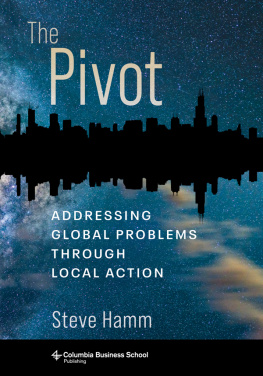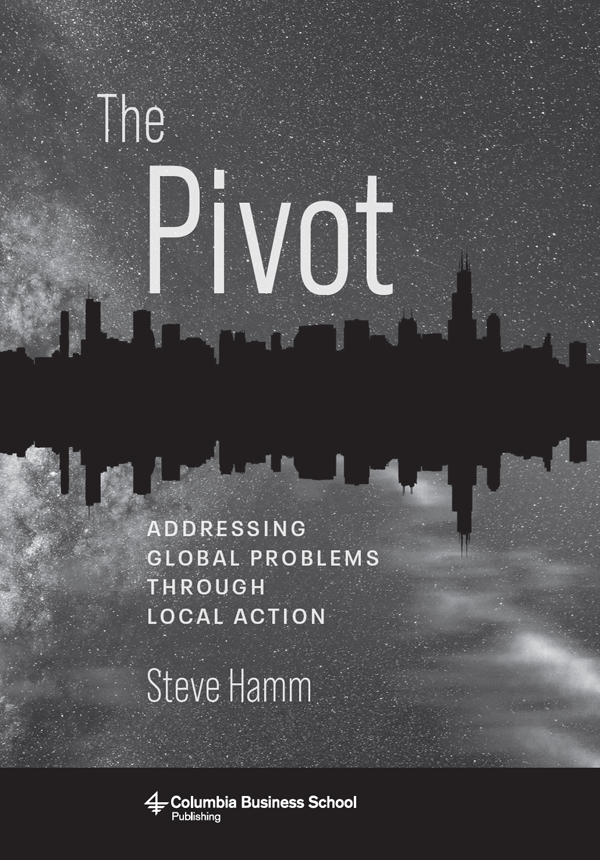Table of Contents
The Pivot
Columbia University Press
Publishers Since 1893
New York Chichester, West Sussex
cup.columbia.edu
Copyright 2021 Columbia University Press
All rights reserved
EISBN 978-0-231-55383-4
Library of Congress Cataloging-in-Publication Data
Names: Hamm, Steve, author.
Title: The pivot: addressing global problems through local action /
Steve Hamm.
Description: New York: Columbia University Press, [2021] | Includes
bibliographical references.
Identifiers: LCCN 2021017237 (print) | LCCN 2021017238 (ebook) |
ISBN 9780231200905 (hardback) | ISBN 9780231553834 (ebook)
Subjects: LCSH: Social problems. | Social action. | Social change.
Classification: LCC HN18.3 .H3375 2021 (print) | LCC HN18.3 (ebook) |
DDC 306dc23
LC record available at https://lccn.loc.gov/2021017237
LC ebook record available at https://lccn.loc.gov/2021017238
A Columbia University Press E-book.
CUP would be pleased to hear about your reading experience with this e-book at .
Cover image: Tom Rossiter, What if We Turned Out the Lights?
Cover design: Lisa Hamm
Tom Rossiter, a Pivot Projects participant, created the composite cover
image, What if We Turned Out the Lights? He has a view of the Chicago
skyline from the roof of his house. He imagined that, if all of the lights in
Chicago were turned out, he would see the Milky Way.
This book is dedicated to Alan Dean, one of the volunteer leaders of Pivot Projects, who was passionate about young people, education, and the environment. He embodied author E. M. Forsters epigraph for Howards End: Only connect He died on April 23, 2021.
Contents
I would like to thank all of the participants in Pivot Projects, in particular the leaders, Peter Head, Colin Harrison, Rick Robinson, Andre Head, Stephen Passmore, Shulamit Morris-Evans, and James Green. They and the other participants welcomed me into the group, spoke openly and honestly, and helped correct my mistakes. I believe, as Margaret Mead is quoted as saying, that small groups of committed citizens can change the world. I hope that the Pivot Projects group and the individuals in it will fulfill their dreams. I would also like to thank my editors, Myles Thompson and Brian Smith, and the book designer, Lisa Hamm.
I n the late 1950s, my family lived in a tidy ranch house in Leawood, Kansas, a suburb south of Kansas City. At the time, Leawood was in the zone where suburban streets began to give way to seemingly endless cornfields stretching to the horizon. We had a small stream running through our backyard. My friends and I spent hours playing back there.
I remember when I began to notice deaths of wild creatures. At first, I would discover lifeless little bird bodies on the grass near the stream. Then there were more dead things: rabbits, mice, a turtle. At some point we started burying the dead animals. We had a little wildlife graveyard.
Satellite view of the former Hamm property in Leawood, Kansas
Google Maps
We didnt know it at the time, but we were experiencing something that became known later as the silent springnot as a metaphor but as a vivid fact of life. Silent Spring, of course, was the book published in 1962 by biologist Rachel Carson. It documented the adverse environmental effects caused by the indiscriminate use of synthetic pesticides, including dichlorodiphenyltrichloroethane, commonly known as DDT. It seems likely that DDT, or one of its chemical cousins, had been killing wild things in our backyard.
While we lived the American dream in our suburban ranch house, wild animals nearby were experiencing the American nightmare.
Carson accused the chemical industry of misleading the public about the risks posed by its products and the government of turning a blind eye to problems. The book was met with a storm of criticism and denial from the chemical industry and its defenders.
In spite of the blowback, Silent Spring became a pivot point in environmental history. The book awakened people to the dangers of pesticide use in agriculture. It led to the creation of the U.S. Environmental Protection Agency (EPA) and to laws and regulations in the United States and elsewhere designed to protect the environment and our species. Those protections included a global ban on the use of DDT except under extreme circumstances.
A Pivot Point
Now were at yet another potential pivot point. COVID-19 and its variants started spreading rapidly worldwide in 2020, sickening tens of millions of people, killing more than 1 million, bringing the global economy to a screeching halt, and provoking civil unrest. Angry men carrying assault rifles threatened the lives of American politicians in and around state capitol buildings. In the United Kingdom, Prime Minister Boris Johnson, after at first making light of the virus, nearly died after contracting it. This has been the worst infectious disease outbreak since the flu epidemic of 1918.
The COVID-19 crisis is a wakeup call. It smacks us with the realization that we face serious risks from a wide variety of natural disasters, including viruses, earthquakes, hurricanes, wildfires, droughts, and sea level rise. Many of these threats are associated with climate change. We are not prepared to deal with them; even worse is that the way we structure society and live our lives make us more vulnerable to these calamities and tend to make them worse. In addition, we poison ourselves and the planet with pollutants and eat unhealthy food. Its like were daring nature to take revenge on us for all of the crap we have given it since Homo sapiens began wiping out other animal species starting thousands of years ago.
Now we threaten ourselves with our own extinctionor, if that prospect seems farfetched, we at least face a not-too-distant future where the human condition, for a vast majority of humans, is far worse than it is today and billions of people live in abject misery. If this happens, it will be our own fault.
COVID-19 devastates us. Like climate change, its a catastrophe of global proportions. But it also creates an opportunity. COVID-19 has taught us that all humans are deeply connected, and we share the same fate. If we join forces, act now, and act boldly, we have an opportunity to make fundamental investments and changes in the way we operate as a species that might slow the advance of global warming and otherwise improve the prospects for future generations.
In a way, COVID-19 is similar to the catharsis astronauts experience as they traverse the near-reaches of the universe in their spacecraft. They peer out of tiny portholes and observe with awe that blue, cloud-swept orb in the distance: the planet Earth. Its a reminder of how small and insignificant we are in the great scheme of things and that we have much more in common with one another than the differences that divide us. The inimitable Carl Sagan summoned such feelings in his 1994 book,











